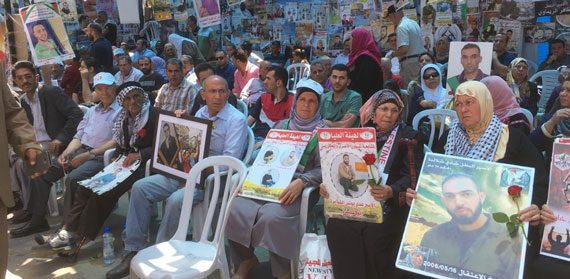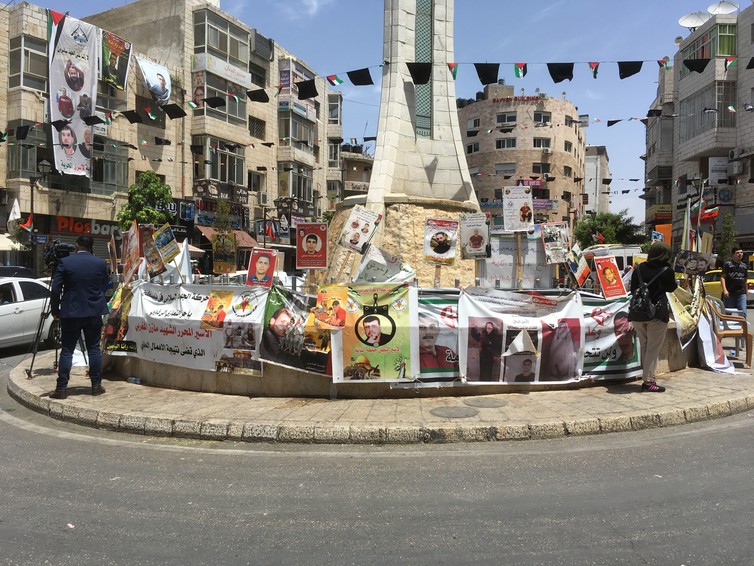Solidarity tent. Author provided (restricted)
Guest post by Emma Heywood
As the massive Palestinian prisoners’ hunger strike enters its second month, there are more than 1,300 detainees on hunger strike in Israeli prisons. More and more family members and supporters are gathering in “solidarity tents” throughout the West Bank and Gaza.
I visited one such tent in Ramallah. Its blue tarpaulin walls were adorned with hundreds of photos of detainees, and about 150 relatives sat on plastic chairs clutching framed photos of their loved ones, eager to recount their stories. Among them were activists and ex-detainees, but also everyday people who had come to support prisoners they consider national heroes and recognise their courage.
The strike began on April 17 in response to a call from imprisoned Fatah leader Marwan Barghouti, who was sentenced 15 years ago for his role in the Second Intifada.
“Israel’s inhumane system of colonial and military occupation aims to break the spirit of prisoners and the nation to which they belong, by inflicting suffering on their bodies, separating them from their families and communities, using humiliating measures to compel subjugation,” he wrote. “In spite of such treatment, we will not surrender to it.”
The atmosphere around the strike is intensifying, with clashes at checkpoints and throughout the West Bank; whole towns are paralysed, and roads leading to Israeli settlements blocked.
This is all taking place against a background of protests and events commemorating 69 years since the Palestinian Exodus, or Nakba, and the forced displacement of Palestinians at the start of Israel’s occupation. Israel and the West Bank also recently hosted Donald Trump, who has declared that brokering peace between Israel and the Palestinians would be the “ultimate deal” but has not yet provided details of any plan. His visit triggered a Day of Rage among Palestinians.
But for all the situation’s complexities, their demands are simple, and according to prisoners’ rights organisation Addameer, comply with international human rights and humanitarian law.
Access denied
Ultimately, they are demanding better conditions and treatment, which at present are deplorable. Take the case of Mahmoud, a 25-year-old former prisoner I met who’s recently been released. In 2012, he was arrested in the middle of the night from his home in Aqabat refugee camp, near Jericho, for throwing stones at checkpoints. He was sentenced to five years in jail. His brother Sami was arrested shortly afterwards and served six years of administrative detention, a type of imprisonment where prisoners can be held indefinitely on the basis of secret information to which they have no access.
Like many others, Sami was moved from prison to prison, meaning that his legal representatives could not locate him in time to request a visitor’s permit before he was moved again, despite being granted official access to him.
Then there’s the demand for family visits. Sami and Mahmoud’s sister, Hiba, told me how the number of visits allowed per month has been cut from two to one as the Red Cross, which organises many of these visits, faces funding cuts. Other mothers described being denied visits by the Israeli Prison Service (IPS) for months on end.
Visits are also hard simply because the prisons are in Israel rather than the Occupied Territories, meaning family members require formal permission even to travel to them. Hiba’s mother, like many of the women in the Ramallah tent, told of humiliating searches and endless queues lasting hours in extreme temperatures before being granted a meagre 45-minute conversation through a glass screen. Worse still, mothers are frequently turned away just as they reach the point of contact as they allegedly have insufficient proof of their relationship with their child.
The demands go on: greater access to legal services, better food, appropriate medical care and treatment, an end to solitary confinement, the use of public telephones. The latter would mean prisoners no longer had to communicate with their families via messages on phone-in shows and requests on local activist radio stations such as al-Huriya or Asra Voice.
Repression and protest
The Palestinian Prisoners’ Media Committee has called the situation “unbearable”, but there is no end in sight. Instead, the IPS is resorting to repressive measures, putting strikers in solitary confinement, confiscating most of their clothes and their radios, and subjecting them to obligatory random headcounts throughout the day.
Gilad Erdan, the Israeli minister of public security, calls the prisoners’ demands “over the top” and maintains that Israel will never give in to “extortion”.
Whether the afterglow of Trump’s visit alleviates or worsens the situation remains to be seen, but there’s little cause for optimism. In March this year, his administration raised concerns about payments from the Palestinian Authority to “terrorist” prisoners. In the West Bank, prisoners’ mothers are protesting outside the Palestinian government’s headquarters to demand a response. None is so far forthcoming.
Within the Occupied Palestinian Territories, the hunger strikers are heroes. Groups of high school children are brought to the solidarity tents and sing in tribute to the detainees’ actions and resilience. In a few past cases, the IPS has agreed to negotiate with prisoners on improving conditions. But as the days wear on, with prisoners being hospitalised as their physical condition deteriorates, it’s hard to imagine a positive outcome to this campaign.
Originally written for ‘the Conversation’.





Comments are disabled